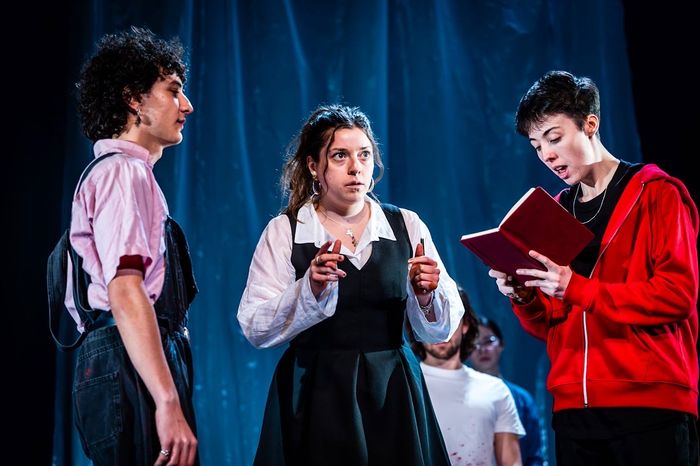Whatever happened to theatre etiquette?
Kasia Gibson explores why it’s still important to know how to behave in a theatre, both in the West End and here in Cambridge

One of my favourite things about the theatre is that it’s in the dark. For a little while, you can, at the risk of sounding like John Boyega in a Vue Cinema, get lost in a truly great story. The lights going down signals an end to conversations, and a shift into the world of the performance. Your focus is drawn entirely to the stage: you aren’t writing an essay, or cooking dinner, or scrolling through TikTok.
At least, you shouldn’t be. Recently, audience members appear to believe that, simply because they have paid for a ticket, they can act however they please. At the start of this year, Andrew Scott revealed that he halted a performance of Hamlet because an audience member was answering emails on his laptop, the audience of Bat Out of Hell found itself distracted by loud conversations, and in Edinburgh, a production of Jersey Boys had to be stopped when a fight broke out. Up and down the country, it seems as though audiences have forgotten how to behave in a theatre.
“Theatre etiquette can be better described as common decency for fellow theatregoers”
Perhaps this behaviour is somewhat reactionary. After all, if you are the one singing along, then you aren’t the one being annoyed by the singing. And what better way to demonstrate your undying love for a show than letting everyone around you know that you can sing all the lyrics?
Until I started reviewing for Varsity last term, I didn’t go to the theatre all that often. It is true that I had an embarrassingly long theatre kid phase, but when you’re paying for an expensive ticket, travel, and maybe a drink that costs more than a house, it must be limited to the occasional treat, so I would always make sure to enjoy it to the full. It is disappointing then when the loudest voice singing ‘I Dreamed a Dream’ is not a professional actor, but a hen party in the front row that visited more than a few bars before the theatre. Modern musicals have started encouraging audiences to clap, sing along, and take photos, which is great for publicity in the age of social media, but it risks encouraging impatient audiences to jump in before their turn.
Now, I am aware that banging on about theatre etiquette makes me sound like a bit of a snob. And often it is right to be wary that someone proclaiming the importance of etiquette is about to shout at you for using the dessert spoon for your starter. But theatre etiquette can be better described as common decency for fellow theatregoers: rather than meaningless rules, it can be boiled down to not disturbing the people around you and, perhaps even more importantly, the people on stage.
“How frustrated would you feel if you had missed the performance of a young Emma Thompson because you decided scrolling through Instagram was more important”
The problem extends to the Cambridge theatre scene. ADC Late Shows are no stranger to drunk audiences and the glare of a phone screen is exceptionally obvious in the small space of the Corpus Playroom. Not to mention, on multiple occasions, I have witnessed people walking out of the theatre mid-scene because they lost interest. While I am the first to admit that not every production is everyone’s cup of tea, I have never been so desperately bored that I couldn’t at least wait for an appropriate break before exiting as if pursued by a bear.
Of course, Cambridge theatre differs from professional theatre in a few key ways. It is, at its heart, a space for amateur productions to experiment and find their feet. Tickets are cheaper, so audiences may be more likely to take a gamble on a student-written production, which could be a masterpiece, or could be a great idea in need of some serious script editing. And it’s true, seeing a student play in Cambridge may be a bigger risk than seeing a well-reviewed, well-funded production on the West End, but that is a risk that we are agreeing to bear when we take advantage of the cheaper ticket prices. The least we can do is pay attention. Think of it this way: how frustrated would you feel if you had missed the performance of a young Emma Thompson because you decided scrolling through Instagram was more important?
Theatre etiquette is experiencing a slump, both nationally and in our own amdram theatre scene. The entitlement of a few audience members is ruining the experience for everyone. When you have bought an expensive ticket, this is annoying, and if it starts driving students away from the cheaper student plays, this risks further cutting the opportunities to reach new audiences. So, maybe next time you go to the theatre, try to sit back and enjoy the ride. Even if the play is the worst thing you’ve ever seen, enjoy the darkness and switch off your brain. And for goodness sake, put your phone on silent in the theatre.
 Comment / Cambridge’s tourism risks commodifying students18 April 2025
Comment / Cambridge’s tourism risks commodifying students18 April 2025 News / Cambridge researchers build tool to predict cancer treatment success19 April 2025
News / Cambridge researchers build tool to predict cancer treatment success19 April 2025 News / Varsity ChatGPT survey17 April 2025
News / Varsity ChatGPT survey17 April 2025 News / Greenwich House occupiers miss deadline to respond to University legal action15 April 2025
News / Greenwich House occupiers miss deadline to respond to University legal action15 April 2025 News / Cambridge researchers find ‘strongest evidence yet’ of life on distant exoplanet18 April 2025
News / Cambridge researchers find ‘strongest evidence yet’ of life on distant exoplanet18 April 2025






